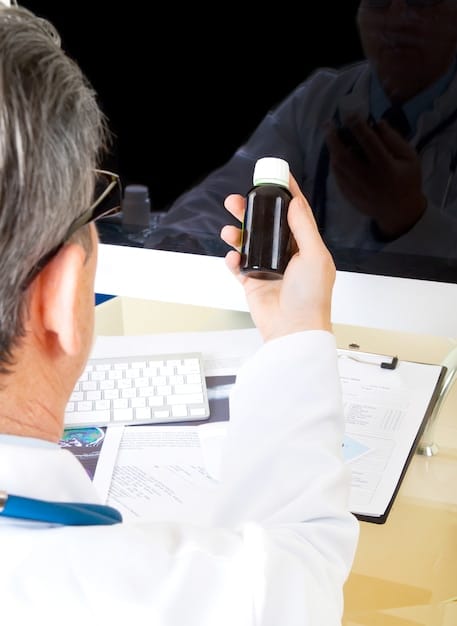Understanding the Latest FDA Recall: Is Your Medication Safe?

Understanding the Latest FDA Recall: Is Your Medication Safe? This article provides insights into how to stay informed about FDA recalls, assess medication safety, and take appropriate steps to protect your health.
Navigating the world of medications can be complex, and it’s crucial to stay informed about potential risks. One of the key ways to do this is by Understanding the Latest FDA Recall: Is Your Medication Safe?
Drug recalls happen for various reasons, and knowing how to respond can significantly protect your health. Let’s explore the process of FDA recalls and ensure you’re equipped to make informed decisions about your medications.
Understanding FDA Recalls: A Comprehensive Guide
The FDA plays a critical role in ensuring that medications available to the public are safe and effective. When a product is found to be defective, unsafe, or mislabeled, the FDA can issue a recall. Understanding the Latest FDA Recall: Is Your Medication Safe? requires knowing what triggers these recalls and what they mean for you.
What Triggers an FDA Recall?
Several factors can lead to a medication recall. These include:
- Manufacturing defects: Issues in the production process that compromise the drug’s quality or safety.
- Contamination: Presence of harmful substances in the medication.
- Labeling errors: Incorrect or misleading information on the drug label.
- Adverse event reports: Significant reports of harmful side effects associated with the medication.
Staying informed about these triggers helps you appreciate the importance of FDA’s role in safeguarding public health.
The FDA categorizes recalls into three classes based on the severity of the potential health risk. Class I recalls pose the most serious threat, potentially leading to severe health consequences or death. Class II recalls involve products that may cause temporary or medically reversible health problems. Class III recalls are for products that violate FDA regulations but are unlikely to cause adverse health consequences. Recognizing these classifications is crucial for assessing the urgency of a recall.

How to Stay Informed About FDA Recalls
Keeping up-to-date with FDA recalls is essential for protecting your health and well-being. Fortunately, there are several reliable sources that provide timely information.
FDA Website and Social Media
The FDA’s official website is the primary source for recall information. You can find recall notices, safety alerts, and other important updates on their website. Additionally, following the FDA on social media platforms like Twitter and Facebook ensures you receive instant notifications about new recalls.
- Check the FDA website regularly for updates.
- Subscribe to FDA email alerts for recall notifications.
- Follow the FDA on social media.
- Use reliable search engines to find recall information.
By actively using these resources, you can stay informed and take prompt action when necessary.
Beyond the FDA’s resources, you can also rely on your healthcare provider and pharmacist for recall information. They often receive direct notifications from the FDA and can advise you on the appropriate steps to take. Additionally, major news outlets frequently report on significant drug recalls, providing another avenue for staying informed. Being proactive in seeking information from multiple sources ensures you are well-prepared to handle any recall situation and reinforces the importance of Understanding the Latest FDA Recall: Is Your Medication Safe?

Assessing Your Medication Safety: What to Do After a Recall
When you learn about a medication recall, it’s essential to assess whether the recalled product affects you personally. Take immediate steps to identify the medications you’re currently taking and compare them against the recall notice.
Identifying Recalled Medications
Check the medication name, dosage, lot number, and expiration date. This information is typically found on the prescription label or the medication packaging. If the details match the recalled product, consult your healthcare provider or pharmacist immediately.
Understanding the Latest FDA Recall: Is Your Medication Safe? Involves a calm and systematic approach. Do not panic. Instead, follow these steps:
- Check medication labels carefully.
- Compare lot numbers and expiration dates with the recall notice.
- Consult your healthcare provider or pharmacist promptly.
By following these guidelines, you can take appropriate action to protect your health.
If you discover that you possess a recalled medication, promptly contact your healthcare provider or pharmacist. They can offer personalized guidance based on your medical history and current health condition. They might suggest alternative medications or provide instructions on how to safely dispose of the recalled product. It’s imperative to adhere to their recommendations and refrain from self-treating or discontinuing medication without expert advice. Your healthcare provider will ensure continuity of care, minimizing any potential health risks associated with the recall.
The Impact of Recalls on Public Health
Medication recalls can have significant consequences for public health, both directly and indirectly. Understanding these impacts helps you appreciate the importance of a robust recall system.
- Adverse health effects: Recalled medications can cause unexpected side effects or fail to treat the intended condition.
- Loss of trust: Frequent recalls can erode public confidence in the pharmaceutical industry and regulatory agencies.
- Economic burden: Recalls can lead to financial losses for manufacturers and increased healthcare costs for patients.
Being aware of these impacts encourages informed decision-making and proactive engagement with healthcare providers.
Mitigating the Negative Consequences
To minimize the negative consequences of recalls, several strategies can be employed. These include:
- Strengthening regulatory oversight: Ensuring rigorous testing and quality control measures.
- Improving communication: Providing clear and timely information to the public.
- Enhancing transparency: Making recall information easily accessible.
By supporting these efforts, you can contribute to a safer and more reliable medication supply chain.
Medication recalls, while sometimes disruptive, are a necessary part of ensuring medication safety. By staying informed, assessing your medications, and taking appropriate action, you can protect your health and contribute to a more reliable healthcare system. Understanding the Latest FDA Recall: Is Your Medication Safe? is an ongoing process that requires vigilance and proactive engagement. Ultimately, the goal is to enhance public trust in the pharmaceutical industry and regulatory agencies, fostering a safer environment for all patients.
Preventive Measures: Reducing Your Risk
While recalls are inevitable, there are steps you can take to reduce your risk of being affected by them. Being proactive about medication safety can provide peace of mind.
Consulting with Healthcare Professionals
Always discuss your medical history and current medications with your healthcare provider. They can help you choose the most appropriate and safest treatments. Additionally, ask your pharmacist about potential side effects and interactions before starting a new medication.
Taking preventive measures is key when Understanding the Latest FDA Recall: Is Your Medication Safe? Here are some tips:
- Maintain an updated list of all your medications.
- Ask your healthcare provider about potential risks.
- Read medication labels carefully.
These steps can help you avoid recalled products and ensure your medications are safe and effective.
Another important preventive measure is to purchase medications from reputable sources. Avoid buying drugs from unverified online pharmacies, as these may sell counterfeit or substandard products. Always ensure that the pharmacy is licensed and certified. Furthermore, be cautious of unusually low prices, as these could indicate a fraudulent or unsafe product. Building a strong relationship with your local pharmacist can also provide an added layer of protection. They can monitor your medications for potential recalls and offer valuable advice on medication safety.
| Key Point | Brief Description |
|---|---|
| 🚨 FDA Recall Triggers | Manufacturing defects, contamination, and labeling errors can trigger recalls. |
| 🔔 Staying Informed | Check the FDA website, subscribe to alerts, and follow social media for updates. |
| 🔍 Assessing Medications | Compare medication details with recall notices and consult healthcare providers. |
| 🛡️ Preventive Measures | Consult healthcare providers, read labels, and purchase from reputable sources. |
Frequently Asked Questions
An FDA recall is the removal of a product from the market because it’s defective or potentially harmful. Recalls happen due to manufacturing issues, contamination, or incorrect labeling, ensuring public safety.
Check the FDA website, subscribe to email alerts, and follow FDA social media accounts for the latest recall information. Your pharmacist can also provide updates on recalled medications.
Contact your healthcare provider or pharmacist immediately. They will advise you on whether to stop using the medication and recommend a safe alternative or disposal method for the recalled product.
Not necessarily. Recalls are classified into three classes based on the potential health risk. Class I recalls pose the most serious risk, while Class III recalls are for minor violations unlikely to cause harm.
Consult with your healthcare provider, read medication labels carefully, and purchase medications from reputable sources to minimize your risk. Staying informed is key to Understanding the Latest FDA Recall: Is Your Medication Safe?
Conclusion
Staying informed about FDA recalls is essential for safeguarding your health. By understanding the recall process, staying updated with recall announcements, and taking preventive measures, you can confidently manage your medications and minimize potential risks.
Understanding the Latest FDA Recall: Is Your Medication Safe? equips you with the knowledge to make informed decisions, ensuring your health and well-being are protected. Always consult with healthcare professionals for personalized advice and guidance.





